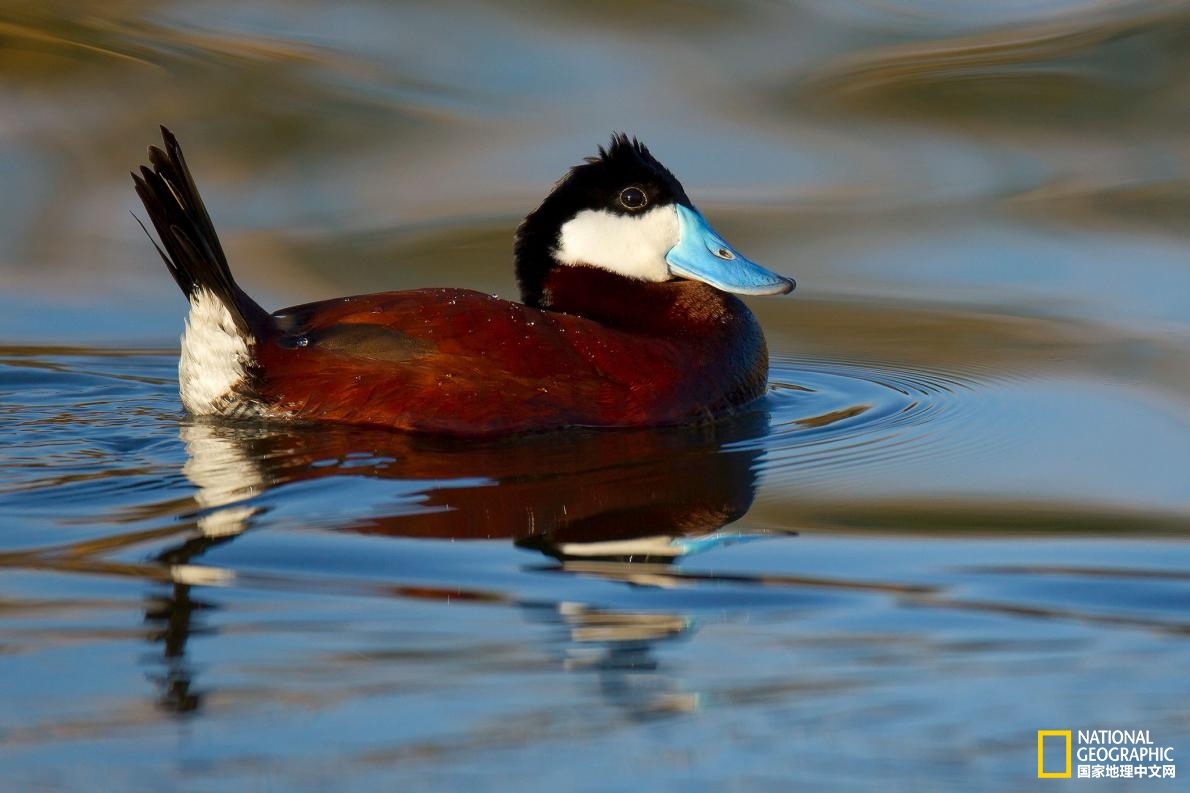A new study has found that for some ducks, tintin size does matter when in a social setting.

The picture shows a male brown hard-tailed duck whose penis can grow to the same length as its body. When mating competition occurs, the dominant male genitalia are longer. Photo by MARESA PRYOR, NATIONAL GEOGRAPHIC CREATIVE
Written by Jason G. Goldman
Patricia Brennan strolls through an outdoor bird farm with a net in her hand. She scooped a hard brown-tailed duck with a net, turned its back to the ground, and pressed it against its abdomen. "If you know where to push hard, you can squeeze out its genitals. They are very cooperative, and male brown hard-tailed ducks are used to being manipulated by humans," she explains.
Patricia Brennan doesn't plan to spend long squeezing the penis of the brown hard-tailed duck out. It wasn't until she was about to graduate from graduate school that she discovered that some birds also had genitalia. This is not surprising, as the vast majority of birds (97%) do not have genitalia. Ducks belong to a very small number of birds with genitalia.
Due to a strange physiological feature, the duck's genitals re-develop every year. As the sunshine times change, the duck's penis begins to grow when the breeding season arrives. Towards the end of the breeding season, the penis begins to slowly shrink again. Brennan and her research team at Manjorie College in Massachusetts found that the group environment in which ducks live also has an impact on their genitals.
Due to conflicts with females, male ducks evolved spiral-shaped genitalia. Brennan speculates whether competition between males affects their genital development. To find the answer to the question, she and her team studied two types of ducks with different mating regimes: the brown hard-tailed duck and the small spotted-backed diving duck. Either pair the two ducks into groups, or divide them into groups of 5 females and 8 male ducks, all of which inhabit natural outdoor bird farms.
Brown hard-tailed ducks have never been paired, and almost all mating is forced. The spotted diving duck does establish a pairing relationship, and attempts to forcibly mate with other females are slightly less frequent.
"They're very cooperative, and the male ducks are used to being manipulated by humans," said biologist Patricia Brennan, referring to the subjects. Photo by PATRICIA BRENNAN
As the researchers expected, the genitals of the small spotted-back diving ducks in the group group were longer than those assigned to the paired group. The findings were published last week in puffin magazine.
Meanwhile, the brown hard-tailed duck's penis is inherently long enough to extend as long as its torso. Brennan didn't think the penis of the brown hard-tailed duck needed to be longer. In a sense, Brennan is right: most of the brown hard-tailed ducks that live in groups don't grow longer genitalia. In fact, she was surprised to find that they had almost no penises.
The brown hard-tailed duck forms a tight hierarchical sequence. The top male has a long penis and can last until the end of the breeding season. Ducks in a subordinate position are unable to grow longer genitalia and therefore employ different strategies. "Other ducks can quickly grow penises and try to mate before the male leader beats him," Brennan said. After mating, their genitals quickly return to a non-reproductive state. If they are lucky enough, they can avoid being chased by the "boss" and retreat.
The effects of collective living on two types of ducks reveal a unique aspect of duck biology: the social environment has a significant impact on penis growth. To date, the only other animal capable of changing genitals according to social circumstances is hermaphrodite barnacles. Barnacles are a crustacean that grows longer genitalia when its habitat is sparsely populated to make it easier to reach nearby neighbors.
This is the case because the animals have the unique ability to re-grow their genitals, says Matt Dean, a biologist at the University of Southern California who was not involved in the study. Other vertebrates do have the ability to regrow and contract the testicles every year, but extending and shrinking the genitals is indeed extremely rare for animals.
"When the environmental conditions are different every year, there is an advantage to having plasticity. If it is not necessary, it may not need to be regrown," he said. Or at least it doesn't need to be that long.
(Translator: Stray Dog)